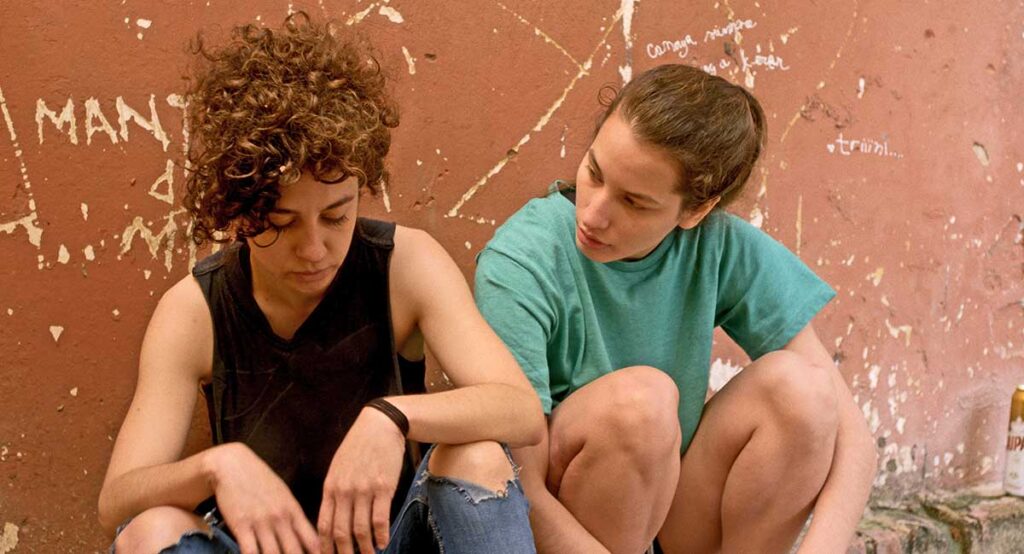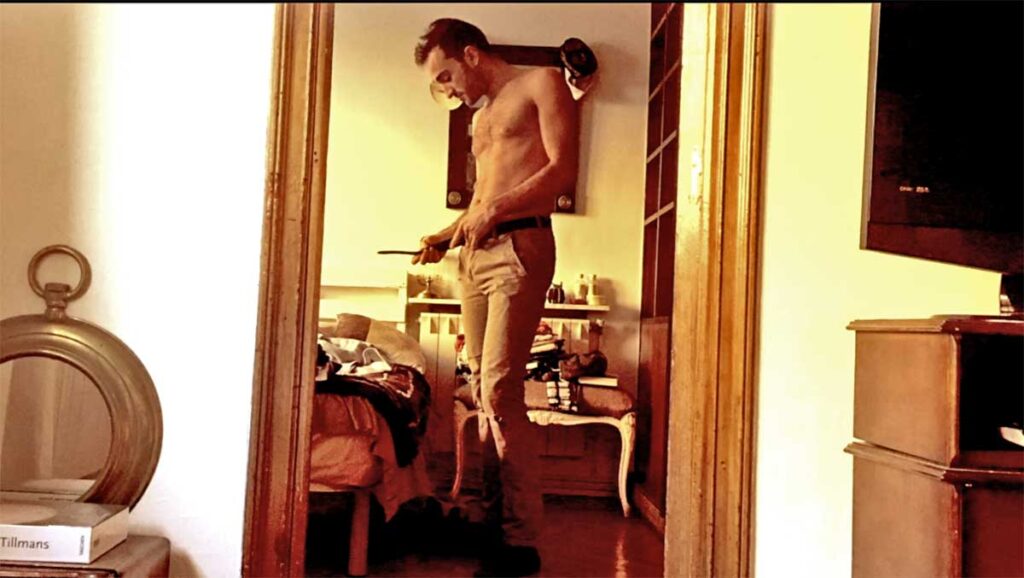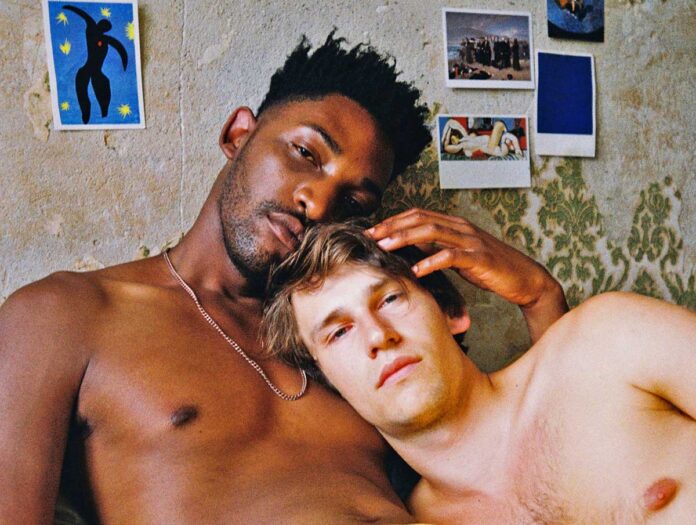Cover image: “Boy Meets Boy,” directed by Daniel Sanchez Lopez.
PrideFLIX, the month-long, online LGBTQ film festival taking place June 1 to July 4, offers a curated selection of queer-themed features, shorts, and documentaries from around the world. Here is a rundown of what to watch.
Drew Droege is generally known for his comic roles, but he gives a fantastic dramatic performance as a frustrated playwright in writer/director James Andrew Walsh’s “The Extinction of Fireflies.” This absorbing film — a screen adaptation of Walsh’s play, shot in the director’s home during the pandemic — has James (Droege) hosting his actor friends Charlotte (Tracie Bennett) and Jay (Michael Urie) for a read through of his new play. Jay’s boyfriend Callisto (Kario Marcel) also attends, and he has some “notes” for James, which makes the sensitive writer bristle. Tensions run high throughout the weekend; friction develops between Jay and Charlotte as well as between Charlotte and James. Walsh’s film is stagy, but it works because the actors deliver the sharp (one might say bitchy, or bitter) dialogue well. Bennett is purposefully shrill (it is always a relief when she’s off screen), and Urie and Marcel provide good foils, but it is Drew Droege’s soulful performance that makes “The Extinction of Fireflies” resonate. Droege reveals his character’s insecurities in a scene between James and Callisto that is quietly moving and this modest film’s high point.
“Adam,” is another filmed play — a National Theatre of Scotland production — inspired by the life of and performed by the transgender Adam Kashmiry. Cleverly shot on a stage, the story depicts Adam’s efforts to get asylum in Glasgow while flashing back to his life as a woman (Yasmin Al-Khudhairi) in Egypt. Kashmiry gives an impassioned performance, discussing words that mean their opposites, or trying to talk with a mental health nurse (Stephen McCole) and an asylum official (Neshla Caplan) about his situation. Flashback scenes with his mother, Maryam (Myriam Acharki), are touching, as is a moment when he confides his gender dysphoria with a coworker, Amira (Rehanna MacDonald). “Adam” addresses issues of dishonor and respect, as well as sexual assault and the catch-22 Adam experiences trying to get testosterone. This hour long production is a rich and insightful dramatization of Kashmiry’s life.
“Boy Meets Boy” is a charming, low-budget romance about Johannes (Alexandros Koutsoulis) and Harry (Matthew J. Morrison) who meet and kiss in a Berlin club. Johannes, a dancer, has lost his wallet, and Harry, a doctor, has a plane to catch back to Britain that night. They spend the day together walking around the city and talking about everything from being gay, to sex, happiness, love, work, and relationships. The attractive leads have a terrific rapport; they are especially affectionate riding a bicycle or dancing in a park. “Boy Meets Boy” may be slight — it runs a scant 69 minutes — but it is appealing as the guys determine if their relationship will last more than a day.
“Boy Meets Boy” is scheduled to screen with “It’s Just in My Head,” a sweet and sentimental short from Italy about Andreas (Claudio Segaluscio) a young man who is crushed on his buddy, Alessandro (Carmine Fabbricatore). When Andreas makes his feelings known, he also worries how Alessandro will react.

The romantic drama “One in a Thousand,” from Argentina, immerses viewers in the world of Iris (Sofia Cabrera), a teenager who becomes enamored with and pursues Renata (Ana Carolina Garcia). The young women eventually meet on a bus and soon start hanging out together. Iris, however, has heard a rumor from a friend that Renata has HIV. How these two young women navigate their relationship — Iris is tentative — forms most of writer/director Clarisa Navas’ meandering film. Although not much happens, “One in a Thousand” is quite compelling. There are interesting subplots involving Iris’ gay cousins, Darío (a scene-stealing Mauricio Vila) and Ale (Luis Molina), who also grapple with their sexuality. Watching these youths care for each other is gratifying. This low-key film, which is set in the projects, provides a strong sense of place as it depicts its LGBTQ characters with humanity and compassion.

Also from Argentina is “Queer Diaries,” out filmmaker Santiago Giralt’s intimate documentary that takes viewers along as he chronicles more than a decade of his experiences. Girault’s tone is wistful, playful, and observational as the film showcases home movie footage and snapshots, including scenes from his wedding and fragments of his past relationship with Julio, a handsome Spaniard. The filmmaker muses about Douglas Sirk, attends pride parades in Madrid and Buenos Aires, and marvels at a crocodile eating marshmallows. Set to an electronic and ambient soundtrack, the impressionistic “Queer Diaries” depicts Giralt’s “many versions of himself.” Some episodes are more engaging than others, but the film is a thoughtful reflection of a gay man’s life, loves, and travels.

“Coalesce,” is writer/director Jessé Miceli’s atmospheric feature debut set in Cambodia. The film tells three stories of economic despair that ultimately converge. Songsa (Songsa Sek) is a shy, sensitive young boy who heads to Phnom Penh to sell clothes out of a tuk-tuk. Thy (Rithy Rom) takes a job at a gay bar and joins a motorcycle club. Phearum (Phearun Eang) is a taxicab driver with a wife and a huge debt. Each character faces pressures by others and experiences reversals of fortune as they try to fulfil their dreams. Some of the storylines feel underdeveloped; one plotline, involving Phearum picking up a fare, goes nowhere. And “Coalesce” is not very gay. Although Thy goes home with a customer from his bar, the film suggests he is gay for pay. Miceli’s drama is accomplished — it effectively captures the rhythm of life for these sympathetic characters seeking personal and economic independence — but it can feel amateurish at times.
The documentary “When the Dawn Comes” profiles the courageous Chi Chia-wei, a pioneer for LGBT rights in Taiwan. He was crucial in the fight for same-sex marriage in 2017, but his activism began decades prior, when he addresses the AIDS crisis (and tried to destigmatize the gay community) by giving out condoms and starting a halfway house for AIDS patients. Wearing a rainbow headband, Chi Chia-wei waves the LGBT flag at pride parades and attends demonstrations to fight against anti-gay referendums. However, he is often defamed in the press by those who want to discredit his efforts — i.e., silence him. Director Hong-Jie Zhang’s portrait is pretty conventional, mixing interviews, observational footage, photographs and news clips, but his subject is inspirational.
In addition, PrideFLIX will showcase a program of web series, and offer a different themed short film program each week — one gay male, one lesbian, two transgender, one horror/fantasy and one featuring shorts made during quarantine. Films are subject to change, so visit http://www.qflixphilly.com/prideflix/ for tickets, schedules, and more information.
